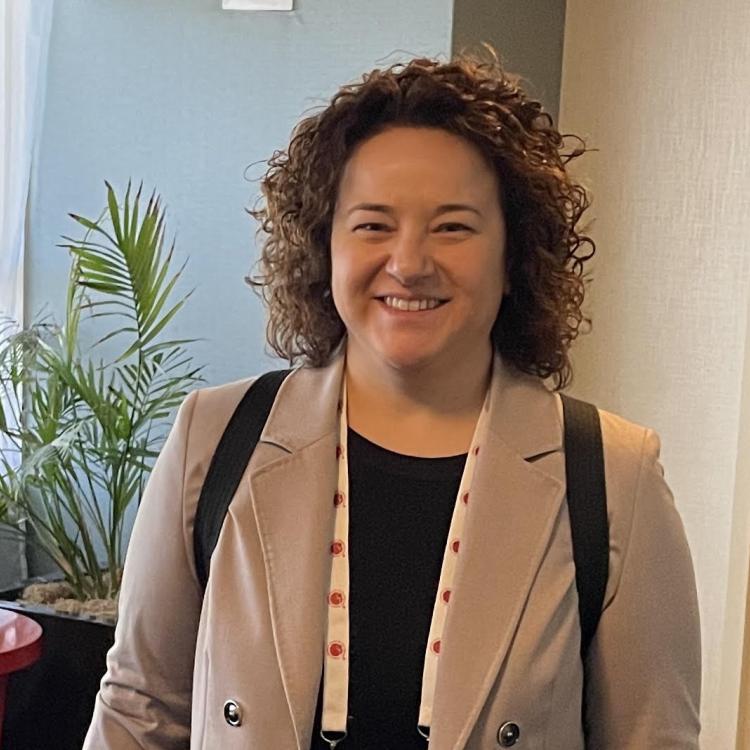
Genetica e genomica dei difetti ereditari del globulo rosso
Associate Professor of Medical Genetics (MED/03) at the Department of Molecular Medicine and Medical Biotechnology, University of Naples Federico II.
Supervisor of the analytical phase of the diagnostic Lab "Medical Genetics of Pediatric Diseases" at CEINGE Advanced Biotechnology Franco Salvatore.
Since 2007, her research has focused on the genetic basis of both complex disorders and Mendelian diseases. In the latter field, she specializes in the clinical and molecular genetics of hereditary red blood cell disorders, with a particular focus on congenital dyserythropoietic anemias (CDA), primarily CDA type II, for which she contributed first-hand to identifying the causative gene in 2009. During her specialization in Medical Genetics (2007-2011) and her PhD in Medical Genetics and Molecular Medicine (2014-2016) at the University of Naples Federico II, she conducted numerous studies aimed at defining molecular genetics and genotype-phenotype correlation in patients affected by CDA. During her post-doctoral experience (2016-2020), her scientific interests focused on the clinical-molecular characterization of patients with hereditary red blood cell disorders through genomic analyses using NGS techniques and multi-omics approaches (DNAseq-RNAseq). Her current research focuses on identifying phenotype-modifying genes, defining complex inheritance modes in hereditary red blood cell defects, and understanding the pathogenic mechanisms underlying these conditions.
She is a member of the Italian Society of Thalassemias and Hemoglobinopathies (SITE), where serves on the steering committee and coordinator of the Laboratory Working Group (https://www.site-italia.org/).
She is also a member of the European Hematology Association (EHA), where she serves on the steering committee of the "Overarching SWG on Diagnostics in Hematology" working group.
Additionally, she is a member of the Italian Society of Human Genetics (SIGU) and EuroBloodNet, the European Reference Network (ERN) for Rare Hematological Diseases.
Hereditary red blood cell defects caused by impaired erythropoiesis comprise a heterogeneous group of diseases with variable frequencies, ranging from rare to low prevalence. These conditions are characterized by complex and not yet fully understood genotype-phenotype correlations.
The activities of the research group focus on identifying new genes associated with these disorders, functionally characterizing genetic variants of unknown significance, and investigating the underlying pathogenic mechanisms using both in vitro and ex vivo cellular models. Advanced genomic analyses also aim to uncover phenotype-modifying genes or variants - genetic factors that influence the severity of clinical manifestations.
This research follows a translational approach, integrating basic science with clinical and diagnostic practice. The laboratory is nationally and internationally recognized as a reference center for the molecular genetics of hereditary anemias. Its goal is not only to expand genetic and biological knowledge in the field but also to identify biomarkers useful for prognosis and development of novel therapeutic approaches for these diseases.
1. Identification and characterization of new disease genes and pathogenic mechanisms underlying hereditary red blood cell defects.
2. Defining the role of genetic modifiers in the pathogenesis and prognosis of hereditary red blood cell defects.
3. Identification of disease biomarkers in preclinical (cellular) models of ineffective erythropoiesis using multi-omic approaches (RNA-seq, proteomics, metabolomics).
4. Identification of new therapeutic opportunities for existing drugs (drug repositioning) in hereditary anemias characterized by ineffective erythropoiesis.
Antonella Nostroso, research fellow, PhD student in Molecular Medicine
Anthony Iscaro, research fellow, resident student in Medical Genetics
Filippo Russo, PhD student in Molecular Medicine
Valeria Pennella, Master's student in Medical Biotechnology
Chiara Maria, Master's student in Medical Biotechnology
1. Marra R, Nostroso A, Rosato BE, Esposito FM, D'Onofrio V, Iscaro A, Gambale A, Bruschi B, Coccia P, Poloni A, Unal S, Romano A, Iolascon A, Andolfo I, Russo R. Unveiling the genetic landscape of suspected congenital dyserythropoietic anemia type I: A retrospective cohort study of 36 patients. Am J Hematol. 2024 Apr 26. doi: 10.1002/ajh.27350.
2. Russo R, Andolfo I, Manna F, Gambale A, Marra R, Rosato BE, Caforio P, Pinto V, Pignataro P, Radhakrishnan K, Unal S, Tomaiuolo G, Forni GL, Iolascon A. Multi-gene panel testing improves diagnosis and management of patients with hereditary anemias. Am J Hematol. 2018 Feb 3. doi: 10.1002/ajh.25058.
3. Russo R, Andolfo I, Manna F, De Rosa G, De Falco L, Gambale A, Bruno M, Mattè A, Ricchi P, Girelli D, De Franceschi L, Iolascon A. Increased levels of ERFE-encoding FAM132B in patients with congenital dyserythropoietic anemia type II. Blood. 2016 Aug 18. pii: blood-2016-06-724328
4. Russo R, Gambale A, Langella C, Andolfo I, Unal S, Iolascon A. Retrospective cohort study of 205 cases with congenital dyserythropoietic anemia type II: Definition of clinical and molecular spectrum and identification of new diagnostic scores. Am J Hematol. 2014
5. Schwarz K, Iolascon A, Verissimo F, Trede NS, Horsley W, Chen W, Paw BH, Hopfner KP, Holzmann K, Russo R, Esposito MR, Spano D, De Falco L, Heinrich K, Joggerst B, Rojewski MT, Perrotta S, Denecke J, Pannicke U, Delaunay J, Pepperkok R, Heimpel H. Mutations affecting the secretory COPII coat component SEC23B cause congenital dyserythropoietic anemia type II. Nat Genet. 2009.

